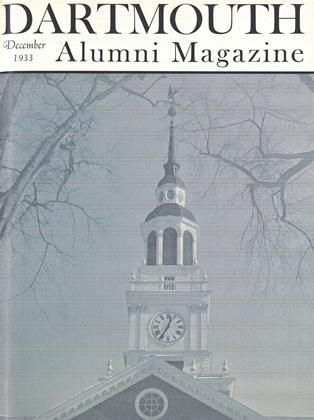CURIOUS LITTLE generalities out of history come to the minds of those who are wont to ruminate upon present things in the light of the past. And in this period of quiet which has fallen upon most American colleges and universities after a time of unrest and expansion and physical growth one looks around—and back.
There comes to mind a picture of a group of buildings of a European University built some hundreds of years ago when the country in which the university stands was passing through a period of great prosperity, brought on either by trade with India or traffic in goods and souls from Africa or by commerce and plunder in the New World. Since that day, strangely enough, few new buildings have been added. In another European country stands a vast Bibliotek or Library erected on funds which came with the opening up of new Eastern territories; that was in 1495.
In America the period between 1923 and 1929 saw a huge growth of physical plants in many, if not most, American institutions. If history tells the tale correctly there may be no such period of growth again for years. Have not the European centers been waiting for centuries? And in such a period of growth certain speculations seemed to be facts. Those colleges which did not avail themselves of the richness of the period may find themselves handicapped in years to come. This is a speculation, a suspicion. May it be the truth? And can it be true that those universities and colleges which went too far in the matter of expansion in this period may not find themselves embarrassed to pay the upkeep in leaner periods?
At Dartmouth certain expansion had become necessary. Library quarters, some laboratory space, dormitory extension, playing field room for recreational activity, new departmental quarters, small improvements within and without, removal of firerisk buildings, renovation of old halls,—-all was a necessary complement to the student expansion, and much of it had been hanging fire for some time. All this in addition to a complete revision and betterment of the whole system of salaries.
And in this period was the appointed time. These things came. The moderation against future indebtedness was also present. An administration which could keep within the limits of growth and yet not plunge into extravagence, an easy and tempting matter to which many institutions succumbed, such an administration carried on the expansion to lines which could be enforced and kept communicable at any time. Those things which might have been included, a new Commons or Union, a new chapel, the creation of an extended campus—these things were reserved for the future. And when the storm came it was possible to hold the advanced lines more easily than if further growth had been forced. What was done had to be done in that period, or not for years to come.
The present Dartmouth, whatever may come in an uncertain future, is the result of the most careful administrative study and action. And since the economies of the whole institution need revision in a changed world they are being made with deliberation and care, with none of the panic that has been evident in some other quarters.
 View Full Issue
View Full Issue
More From This Issue
-
 Article
ArticleHANOVER BROWSING
December 1933 By Rees H. Bowen -
 Class Notes
Class NotesClass of 1910
December 1933 By Harold P. Hinman -
 Class Notes
Class NotesClass of 1930
December 1933 By Albert I. Dickerson -
 Sports
SportsFOLLOWING THE BIG GREEN TEAMS
December 1933 By C. E. Widmayer '30 -
 Class Notes
Class NotesClass of 1929
December 1933 By F. William Andres, Gus Wiedenmayer -
 Article
ArticleENGINEERING, A WAY OF LIFE
December 1933 By Arthur G. Tozzer '02







